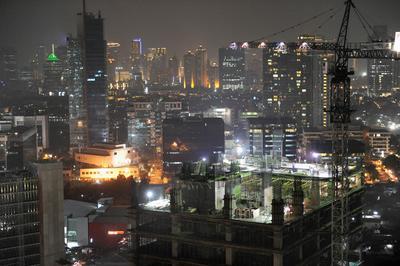Inflation, at 4.6 per cent in the year to August, remains safely within Bank Indonesia’s target range, although food prices have increased relatively quickly. Food price increases are partly international in origin, but have been exacerbated by trade restrictions, including import quotas on beef and live cattle and restrictions on horticultural imports to the Jakarta port of Tanjung Priok.
One troubling sign is a growing emphasis on restrictive policies to encourage value adding on a sector-by-sector basis. A new export ban for unprocessed mineral ores reflects this trend.
Requiring domestic minerals processing is a very inefficient way to capture additional rents from the mining sector. Minerals processing is also an unusual choice for a sector to favour given that it is capital and energy intensive but provides relatively few jobs. Focusing on improving infrastructure, institutional quality and human capital is a much more efficient way to boost overall value added in the economy.
The current account deficit spiked to 3.1 per cent of GDP in the June quarter as exports fell and imports continued to grow. While the size of the deficit is largely a function of the external slowdown, the government has unfortunately reacted by introducing additional policies to encourage import substitution. Indonesia’s unnecessary campaign against imports carries a high price, and is a completely out-dated approach in the modern era of global production networks.
President Susilo Bambang Yudhoyono has made several high-profile speeches calling for a ‘green growth agenda’, including at the Center for Forestry Research in Bogor in June. Green growth is economic growth that does not overly compromise the quality of the environment. The goal is not to slow the economy, but to address market failures to reduce the extent to which economic growth has negative environmental impacts.
One area in which government policy settings are notably non-green is energy subsidies, which encourage both overconsumption of fossil fuels and pollution. The proposed budget for 2013 includes a massive 41 per cent increase in subsidies for fuel (in nominal terms). The budget also includes a 25 per cent increase in subsidies for electricity, despite a plan to raise electricity prices by 15 per cent in 2013. The overall share of energy subsidies in central government expenditure (24.1 per cent) is almost the same as in 2004 (24.0 per cent), the year President Yudhoyono came to office. This is a record which is unlikely to win the president a legacy as a green reformer.
The news on Indonesia’s forests is slightly more positive, although the challenges are large and loss of forests remains rapid. A two-year moratorium on new permits to clear primary forests and peatlands commenced in May 2011, but sizeable exemptions have been provided, for example for projects to develop energy, rice, or sugar. There have also been violations of the moratorium, such as the burning of parts of the Tripa forest in Aceh.
The last decade has seen booms in Indonesia’s palm oil and coal sectors, and the country has become the largest exporter of both commodities. The two booms are providing large economic benefits, mostly off Java. Oil palm plantations provide 1.6 per cent of Indonesia’s jobs, although coal mining is a smaller employer. But the booms have also brought large environmental costs, particularly by being major contributors to deforestation.
Considerable attention is currently being devoted to developing a system for payments to reduce emissions under the United Nations’ Reducing Emissions from Deforestation and Degradation (REDD+) scheme. Payments under REDD+ may one day help to tilt the economics of land use in a greener direction and contribute to the livelihoods of people in forest areas. But progress remains incremental, and much stronger institutions to monitor and enforce forest conservation laws are required.
Greening growth is a nice idea, and green growth policies such as removing regressive energy subsidies and reducing pollution have the potential to benefit the poor. But with President Yudhoyono’s presidency entering its final years, the success of the green growth agenda will ultimately depend on whether the next president, who will take office in 2014, throws his or her support behind the cause.
Paul J. Burke and Budy P. Resosudarmo will be presenting the Economic Update at the Indonesian Update Conference 2012, to be held at the ANU, 21–22 September. The full content of their update will appear in the next issue of the Bulletin of Indonesian Economic Studies.

